English : Term 3 Unit 3 : Secret of Success
UNIT 3
Secret of Success
I will never give up until I basket the ball. Will you?
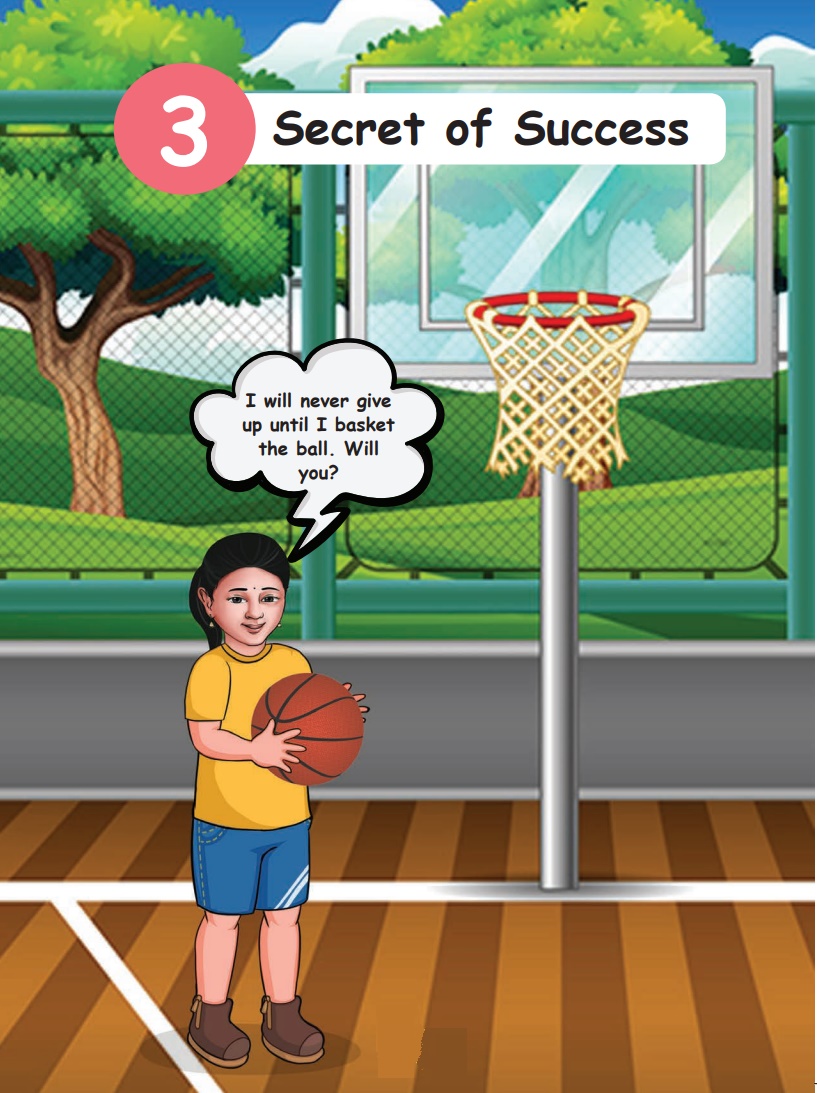
MY LITTLE PICTIONARY
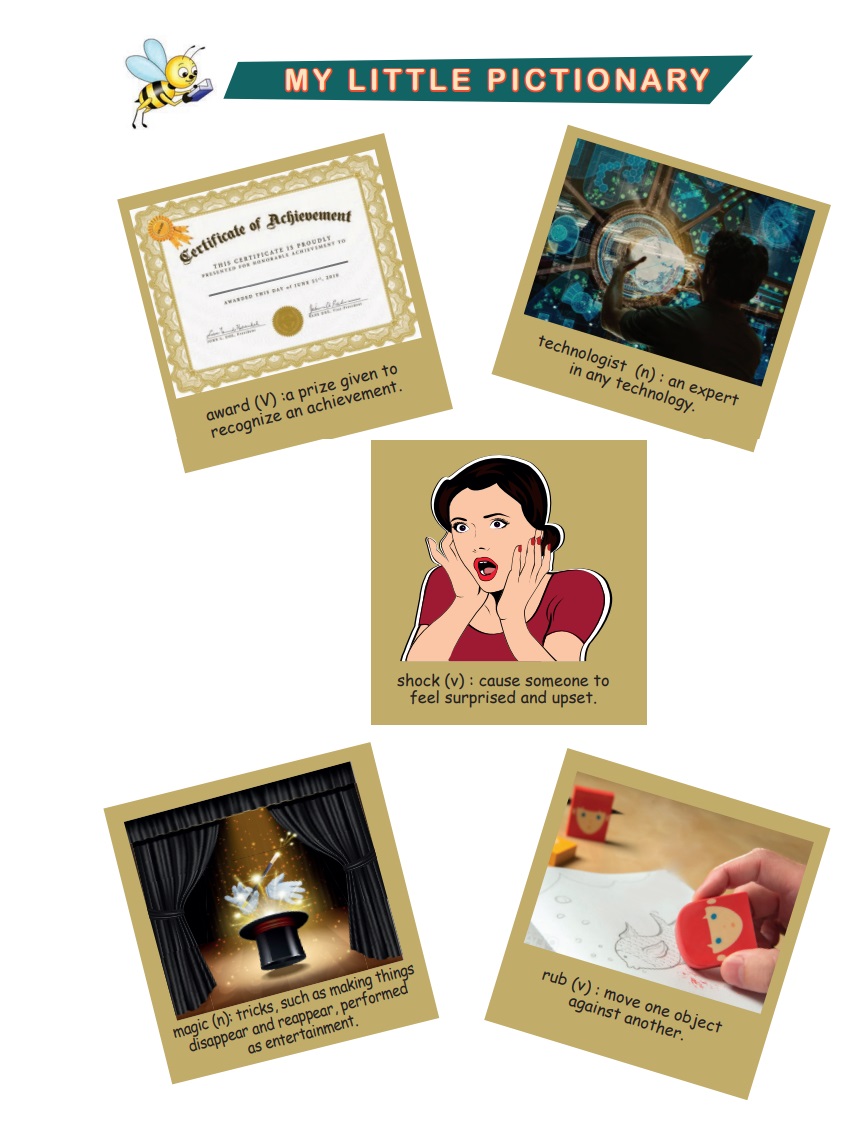
LET US LEARN
The Struggling Star
Farhan and his father are reading the newspaper, the favourite part of his morning. He gets up, brushes his teeth, drinks his milk and sits with his father to read the news every day.
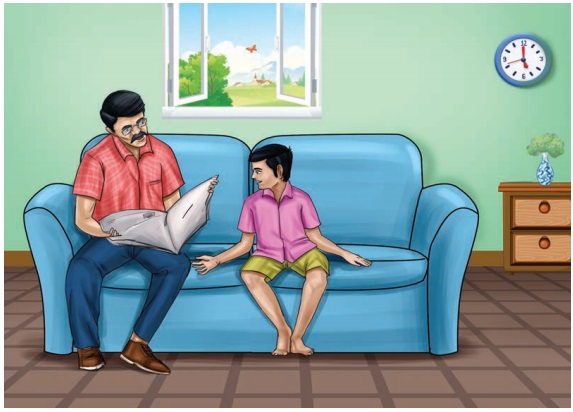
Farhan: Abbu, what is this y-o-u-n-g leaders award?
Father: It is young leaders award. It is given to only 17 people from around the world every year. It recognises the effort they have taken to make the world a better place.
Farhan: Wow! Only 17? I am so proud that an Indian has got this award.
Father: Do you know why he got it?
Farhan: No, can you please tell me?
Father: I am happy that you asked. It is very important to not only be proud when we see or hear such news. We should also…
Farhan: Learn from it! Yes, Abbu I remember this.
Father: Very good! Kartik is a technologist who has not let his disability stop him from learning. Not only that, he has empowered other people with disabilities to be successful IT engineers.
Farhan: What disability?
Father: Kartik is blind. Let me tell you the story of his childhood. Kartik studied in Delhi Public School in New Delhi. He was a smart and bright student. Kartik did well in all subjects but he liked science the most. Everything was good for Kartik till his 10th standard. After scoring full marks in 10th standard public exam, Kartik wanted to study Science in 11th and 12th standard.
Farhan: I am sure, he got it. He got full marks in 10th exams!
Father: No. Actually, the government rule in Delhi did not allow blind children to study science after 10th standard.
Farhan: I do not think that’s fair. Everyone should be able to study what they like!
Father: This is what Kartik also felt. He loved Science, and he wanted to study that. He refused to let his disability come in the way. He challenged the government and held campaigns to get permission. Finally, after nine months, he got permission to study Science. Not only that, he made sure that all blind students have permission to study Science if they want!
Farhan: Wow! 9 months is so long! I am sure I would have given up.
Father: Change takes time Farhan. We should take work hard and be patient if we want to see change happen around us. Like Kartik, was the first blind student in India to study Science.
Farhan: What did Kartik do after that?
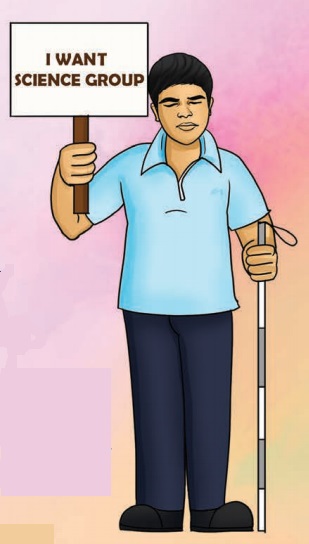
Father: Kartik’s dream and passion were never limited. His love for Science helped him get more than 95% in his 12th board exam. His dream was to study in an IIT. IIT is one of the best colleges in our country!
Farhan: I want to study in IIT too!
Father: Good! But only if you want to study Science. Every subject has different best colleges. We will talk about that some other day.
So, as I was saying, he wanted to study in the IIT But, none of the sixteen IITs in India enrolled him.
Farhan: What? Again?
Father: Yes, Kartik was sincere and learnt well. He was also very good at Science. But our colleges did not recognise his talent and treated him unfairly.
Farhan: Then? Did he change their mind too?
Father: Yes, he did! After many months he made the colleges open their doors to blind students. This helped nearly 15 blind students to study engineering in these colleges.
Farhan: He must be a strong person.
Father: Yes, he is strong. He is strong in his beliefs and learnings. He is strong in the effort he puts. What do you think he did after that?
Farhan: He must have studied in the IIT.
Father: No, he did not. He got an admission to study at Stanford University in the USA. It is one of the best colleges in the world. He went there and studied computers.
Farhan: Amazing!
Father: He also started two more companies that aim at helping children with disabilities reach their full potential. He believes that education and technology are important to ensure children learn and sustain themselves. He says that he will try for many more months and years to come to make sure that all the 130 crore people reach their full potential.
Farhan: He is inspiring. I will also work hard and achieve my dreams, even if I don’t always have the support I need.
Father: Very good! If we work hard, there will always be support for us. Sometimes the support comes from outside, but many times it comes from within us. Now, go get ready. It is time to go to school.
Farhan: Yes Abbu.
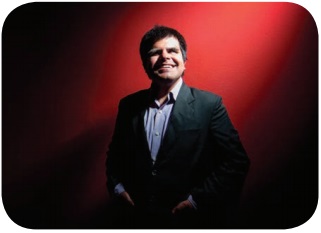
Glossary
recognize: to know/ accept someone or something.
empowered: to give the authority or power
campaigns: activities for some specific purpose
potential: talent/ ability
sustain: keep going
inspiring: to influence/ attract
LET US UNDERSTAND
A. Choose the best answer.
1. Kartik is _______________.
a ) deaf
b) blind
c) dumb
Answer: b) blind
2. The Delhi government did not allow blind children to study science after __________________.
a ) 8th standard
b) 10th standard
c) 12th standard
Answer: b) 10th standard
3. Finally, ______________, he got permission to study Science.
a ) after 11 months
b) after 7 months
c) after 9 months
Answer: c) after 9 months
4. He got an admission to study at Stanford University __________.
a ) in the USA
b) in the UK
C) in Russia
Answer: a ) in the USA
B. Answer the following questions.
1. What subject did he like the most?
He liked science most.
2. How many marks did he score in his 12th board exam?
In his 12th board examination he got more than 95%.
3. What was his dream ?
His dream was to study in IIT
4. Is there something that you will struggle for? why?
I will struggle for visually impaired people to get more job opportunities because they are not selected for certain jobs.
5. What was Farhan’s father advice to his son?
Farhan’s father advised him to work hard. If we work hard the support will come to us from outside. But mostly the support should come from inside.
LET US BUILD
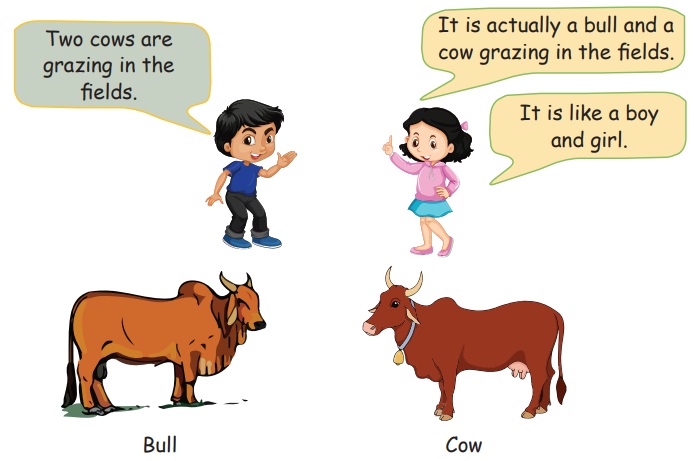
Two cows are grazing in the fields.
It is actually a bull and a cow grazing in the fields.
It is like a boy and girl.
Gender of a noun indicates whether a person or animal is male or female.

Masculine nouns are words used for men, boys, and male animals.
Feminine nouns are words used for women, girls, and female animals.
As Ranjani introduces her family members to us, we can identify the masculine and feminine nouns in the family .
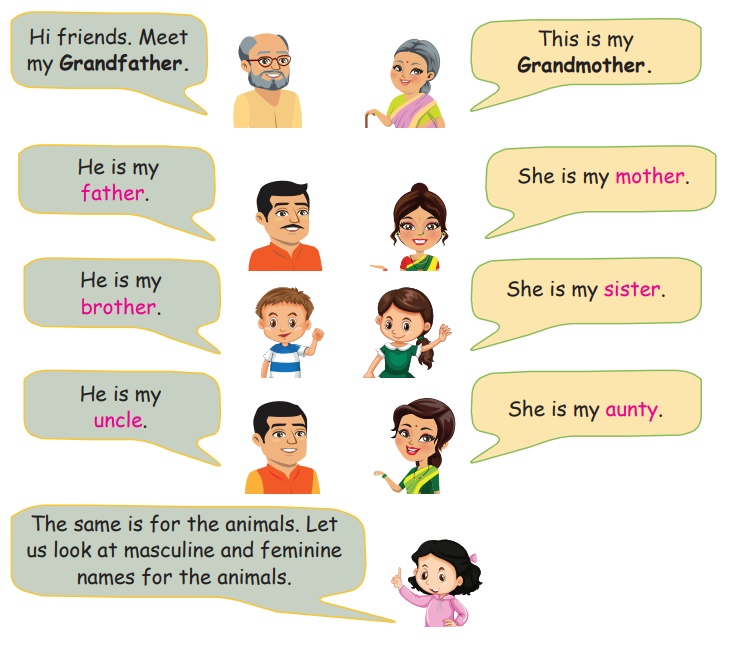
Hi friends. Meet my Grandfather.
He is my father.
He is my brother.
He is my uncle.
This is my Grandmother.
She is my mother.
She is my sister.
She is my aunty.
The same is for the animals. Let us look at masculine and feminine names for the animals.
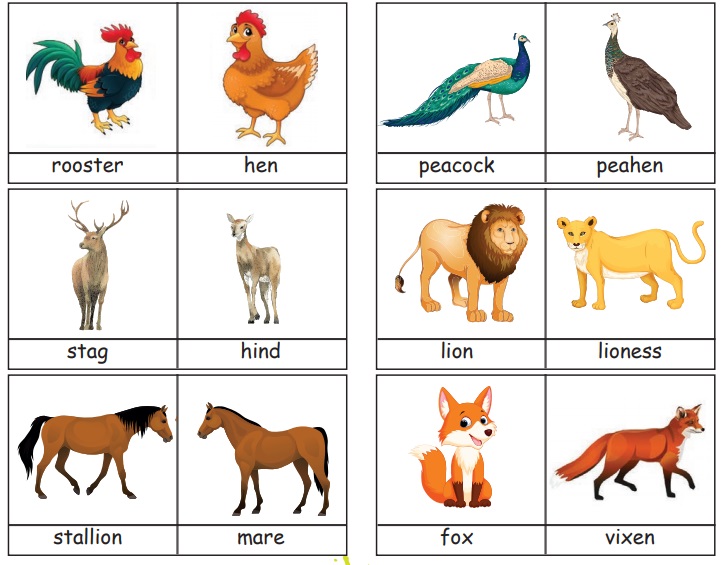

rooster : hen ; peacock : peahen ; stag : hind ; lion : lioness ; stallion : mare ; fox : vixen ; ram : ewe ; drake : duck
A. Match the masculine noun with the feminine noun.
1. Son – princess
2. Tiger – heroine
3. King – daughter
4. Prince – queen
5. Hero – tigress
Answer:
1. Son – daughter
2. Tiger – tigress
3. King – queen
4. Prince – princess
5. Hero – heroine
B. Change the masculine noun to feminine noun in the given sentences.
1. My uncle presented me a watch. aunt
2. A young man was driving the car. woman
3. May I come in sir? madam
4. The waiter took the order. waitress
5. The rooster scratched the earth for worms. hen
C. Complete each sentence by using the following words.
( uncle, bride, bull, niece, king )
1. Farmer John has four cows and two bulls.
2. The bridegroom and the bride entered the hall.
3. The king and queen attended the court.
4. Charles greeted his uncle and aunt.
5. I played with my nephew and niece.
LET US SING
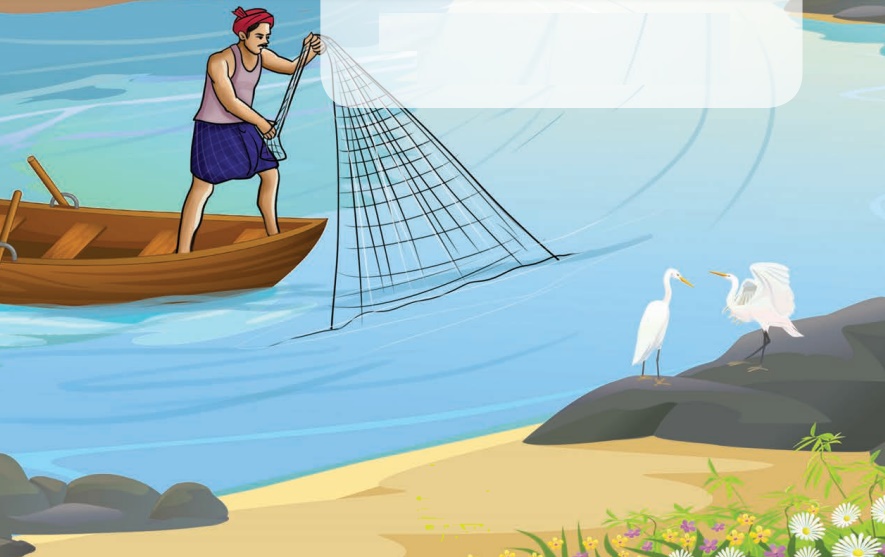
Never give up
The fisher who draws his net soon,
Won’t have any fish to earn.
The child who shuts up his ears soon
Won’t have the chance to learn
One who tackles the huddles to fend
May win the world at the end.
Don’t feel down when you are slow
Keep moving and let your life glow
Let us persevere at work or play,
And never give up all day.
Glossary
chance: opportunity
fend: to defend
persevere: put effort continuously
sincere: truthful
tackle: to solve
A. Match the following rhyming words.
1. earn – glow
2. fend – day
3. slow – learn
4. play – end
Answer:
1. earn – learn
2. fend – end
3. slow – glow
4. play – day
B. Fill in the blanks.
1. If the fisher draws his net soon, he won’t get fish in the net.
2. The child won’t learn anything, if he closes his ears.
3. A person who overcomes problems, will get success at the end.
4. Keep moving though your progress is slow.
5. Work or play, let us persevere.
C. Appreciation Questions.
1. Why should a fisherman wait?
A fisherman should wait for the fish to come into his net.
2. Who wins the world at the end?
One who tackles hurdles patiently will win the world at the end.
3. What happen to a child who shuts his ears?
A child who shuts up his ears will not learn anything
4. Should we worry when the progress is slow?
We should not worry when the progress is slow. We should continue to move.
5. What should we do for success?
For success we should have perseverance and hard work. We should continue to work. We should not give up our efforts.
LET US KNOW
Present continuous tense
Present continuous tense is used to describe the actions that are happening at moment of speaking or unfinished actions

The present participle form is used in present continuous tense with auxiliaries am, is and are. Come let us use it

Use watch in correct verb form to complete sentences.
I am watching TV.
We are watching the show.
You are watching his dance.
He is watching TV with his friends.
She is watching her father cook.
It is watching the sky.
They are watching the match.
Let us see when to use present continuous tense.
Things that are happening now:

She is speaking over phone now.
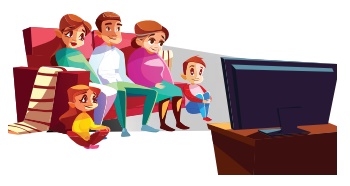
They are watching tv.
Fixed actions in the near future

She is going to Trichy on Saturday.
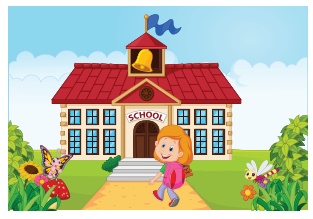
Mary is going to a new school next term.
Say what they are doing now?
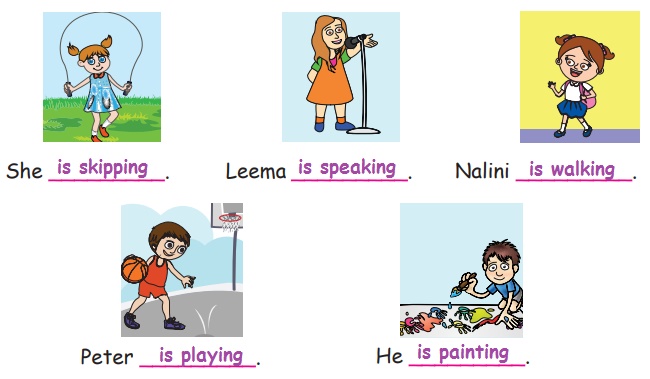
She is skipping.
Leema is speaking.
Nalini is walking.
Peter is playing.
He is painting.
Change the sentence into present continuous tense.
1. I read the story.
I am reading the story.
2. She plays the piano.
She is playing the piano.
3. Pinku works in a power plant.
Pinku is working in a power plant.
4. Ananthi helps her friend Janu.
Ananthi is helping her friend Janu.
5. They draw picture of a boy.
They are drawing the picture of a boy.
Complete the story using present continuous tense.
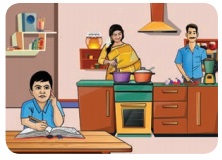
Shaheen : Hello, Varun?
Varun : Tell me Shaheen.
Shaheen : What are you doing?
Varun: I am reading.
Shaheen : Good. What is your Dad doing?
Varun : He is helping Mom
Shaheen : Your mom?
Varun : She is cooking.
LET US LISTEN
Marty: Thank you for tuning into maple leafs. worldwide weather report we’ll be checking on the weather all over the world with Tim Tiger. First Canada, how’s the weather?
Tim Tiger: It’s snowy! It’s snowy in Canada.
Marty: Thank you Tim. Next, Mexico. Tim how’s the weather?
Tim Tiger: It’s sunny. It’s sunny in Mexico.
Marty: Thank you Tim. Next, England. Tim how’s the weather?
Tim Tiger: It’s foggy. It’s foggy in England.
Marty: Thank you Tim. Next, France. Tim how’s the weather?
Tim Tiger: It’s rainy. It’s rainy in France.
Marty: Thank you, Tim. Next, Russia. Tim how’s the weather?
Tim Tiger: It’s cold. It’s cold in Russia.
Marty: Thank you, Tim. Next, Australia. Tim how’s the weather?
Tim Tiger: Hold on. I’m coming. It’s hot. It’s hot in Australia.
Marty: Are you okay Tim?
Tim Tiger: I’m good Marty. What’s next?
Marty: Next is Japan.
Tim Tiger: Japan? Alright!
Marty: Next is Japan. Tim, how’s the weather in Japan? Tim?
Tim Tiger: I’m coming
Marty: Tim!
Tim Tiger: Now, I’m on my way. Oh I’m almost there. It’s cloudy.
It’s cloudy in Japan.
Marty: Thank you, Tim. Next is Mars.
Tim Tiger: Mars?
Marty: Yes Mars.
Tim Tiger: No Marty. I quit. Well thank you for tuning in to maple leafs worldwide weather! See you next time.
Listen to the audio and respond to the following questions.
1. It is _______ in Canada.
a) rainy
b) snowy
c) foggy
Answer: b) snowy
2. The weather is sunny in _______.
a) Mexico
b) Canada
c) Japan
Answer: a) Mexico
3. The weather in England is_______.
a ) cloudy
b) cold
c) foggy
Answer: c) foggy
4. The weather is hot in _______.
a) Australia
b) France
c) Russia
Answer: a) Australia
5. It is so cloudy in _______.
a) Canada
b) Japan
c) Mars
Answer: b) Japan
Note to the teacher: Scan the QR code to listen to the audio. Let the children listen to the audio and answer the question. The listening passage is given at the end.
LET US SPEAK
A boy and a girl are talking about their holiday.
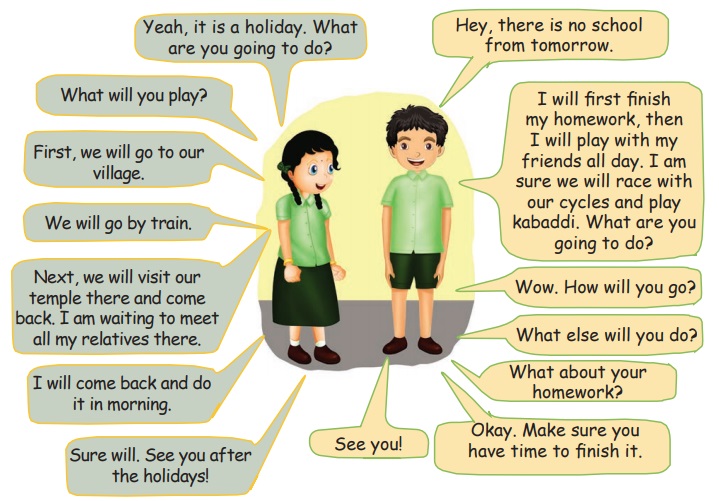
Hey, there is no school from tomorrow.
Yeah, it is a holiday. What are you going to do?
I will first finish my homework, then I will play with my friends all day.
What will you play?
I am sure we will race with our cycles and play kabaddi. What are you going to do?
First, we will go to our village.
Wow. How will you go?
We will go by train.
What else will you do?
Next, we will visit our temple there and come back. I am waiting to meet all my relatives there.
What about your homework?
I will come back and do it in morning.
Okay. Make sure you have time to finish it.
Sure will. See you after the holidays!
See you!
When you want to talk about things to do in the holiday, you should always ask your friends and get to know more.
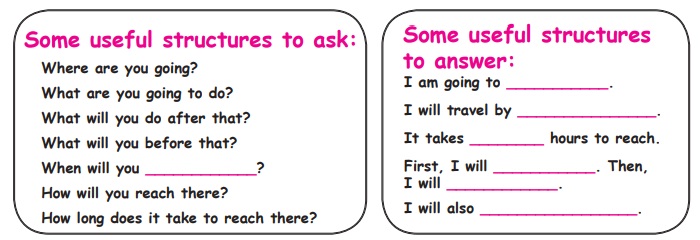
Some useful structures to ask:
Where are you going?
What are you going to do?
What will you do after that?
What will you before that?
When will you there?
How will you reach there?
How long does it take to reach there?
Some useful structures to answer:
I am going to Chennai.
I will travel by train.
It takes eight hours to reach.
First, I will go to my uncle’s house. Then,
I will go to Marina Beach.
I will also a Mall.
Note to the teacher: Make the children know how to express their holiday plan and experience.
LET US READ
The Magic Pencil
Chris was a little boy who enjoyed going to school and doing all sorts of things except art and writing. Using brushes and pencils was not easy for him. So, his artwork was never a happy ending, and he would give up quickly.
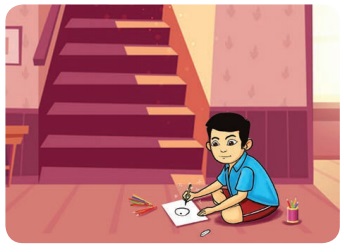
But one day Chris found a pencil of such lovely colours that he could not resist and he tried to draw a circle. As always, it did not go well, he was about to throw the pencil away. Just then, his drawing began to speak to him.
“Hey! Are you going to leave me like this? At least draw me a pair of eyes,” said the drawing. Chris was shocked, but he managed to draw two little spots inside the circle.
“Much better, now I can see myself,” said the circle, looking around at itself. “Ahh! What have you done to me?”
“I don’t draw very well,” said Chris, trying to make excuses.
“OK. No problem.”, said the drawing. “I am sure that if you try again, you’ll do better. Go on, rub me out!” So, Chris erased the circle and drew another one. Like the first one, it was not very round.
“Hey! You forgot my eyes again!”
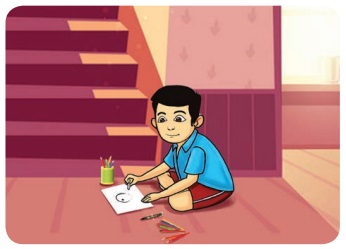
“Oh, yeah.”
“Hmm, I think I’m going to have to teach you how to draw until you can do me well,” said the circle with its quick, squeaky little voice.
Chris, who was still shocked, thought that this was a good idea. He immediately found himself drawing and erasing circles. The circle would not stop saying “Rub this out, but carefully; it hurts,” or “Draw me some hair, quickly, I look like a lollipop!” and other funny remarks.
After spending the whole afternoon together, Chris could now draw the little figure much better than most of his classmates. He was enjoying it so much that he did not want to stop drawing with this crazy new teacher of his. Before going to bed that night, Chris gave his new teacher a hearty thank you for teaching him to draw.
“But I didn’t do anything!” answered the little drawing.
“Don’t you see that you’ve been practising a lot, and enjoying it all the while? I bet that’s the first time you’ve done that!”
Chris stopped to think. The truth was that he had drawn so badly because he had never practised more than ten minutes at a time. He had always done it angrily. So, what the little drawing had said was correct.
“You are correct, but, thank you,” he said. He carefully kept the pencil in his school bag before going to sleep.
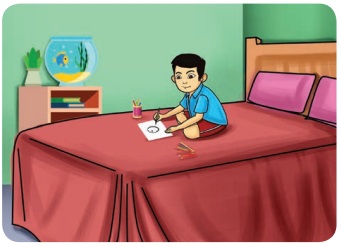
The next morning Chris jumped out of bed and went running to find his pencil, but it was not there. He searched everywhere, but there was no sign of it. The sheet of paper on which he had drawn the little figure, although still full of rubbing out marks, was completely blank. Chris was worried, and he did not know if he had spent the previous afternoon talking with the little man or whether he was dreaming all of it.
So, to settle the matter, he took a pencil and paper and tried to draw a little man.
Think: Say whether he can draw well now. If yes, why?
Yes, he can draw well now because he had been practising hard. His continuous practice helped him to draw well now.
It turned out not bad at all, except for a couple of rough lines. He imagined his little teacher telling him to rub and fix them. Chris gladly rubbed out those bits and redrew them. He realised that the crazy little teacher had been right: it made no difference whether you had the magic pencil or not.
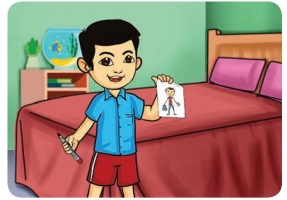
To learn to do things, you only needed to keep trying and to enjoy while doing so.
From that day on, whenever Chris tried to draw or paint, or do anything else, he always had fun imagining his drawing telling him “Come on, my friend, do me a bit better than that! I can’t go out looking like this!”
A. Choose the best answer.
1. Chris enjoyed doing all sorts of things except, writing and ________.
a. singing
b. art
c. acting
Answer: b. art
2. One day Chris tried to draw a __________.
a. rectancular
b. circle
c. Triangle
Answer: b. circle
3. Pencil asked him to draw _________.
a. pair of eyes
b. pair of ears
c. Face
Answer: a. pair of eyes
4. Draw me some hair, quickly, I look like a ___________.
a. princess
b. lollipop
c. prince
Answer: b. lollipop
5. Before going to bed that night, Chris gave his new teacher a _______.
a. hearty thanks
b. costly pen
c. a ring
Answer: a. hearty thanks
B. Answer the following questions.
1. What was the truth finally learned by Chris?
Finally Chris learnt that he could draw better if he continued to practise.
2. How can we do our work better?
We should practise continuously. We should enjoy doing it. Thus we can do our work better.
3. Why did he rub the circle again and again?
The circle did not look round and good. So he rubbed the circle again and again.
4. Why was Chris worried?
The next morning Chris could not find the pencil. So he was worried.
5. What is the one thing you will try and improve after reading the story? How?
I will try my best to improve what I have done. For that, I will do it again and again. I will also enjoy doing it.
LET US READ ALOUD
A. Read the passage 3 times and colour the medal for each time.
The school was decorated for the Annual Sports Day. The children came to the running track to cheer the runners. The next event was 800 meters running. Megala was in the race. She wanted to win the race, but the other runners were district and divisional winners. The race started. All had to finish two laps. At the end of the first lap, Megala was in the fifth place. Suddenly, she fell on the ground. Everyone ran to help her. But before that she got up and started to run. All children and teachers cheered her. She had come last, but the headmaster gave her a special prize.
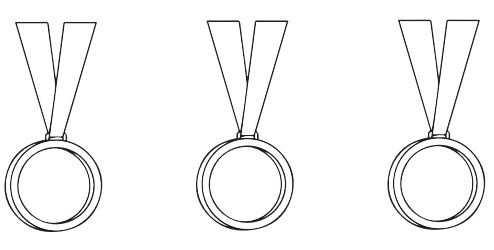
Answer the following questions.
1. What was the event Megala participated?
Megala participated in the 800 meters running.
2. Why did everyone support Megala?
Megala competed with district and divisional winners.
So everyone supported her.
3. What is the main idea of the story?
Perseverance pays.
4. Why did the head master give Megala a special prize?
Megala persisted in her efforts. She did not give up. So the headmaster gave Megla a special prize.
LET US WRITE
Let us look at the picture and read the story:
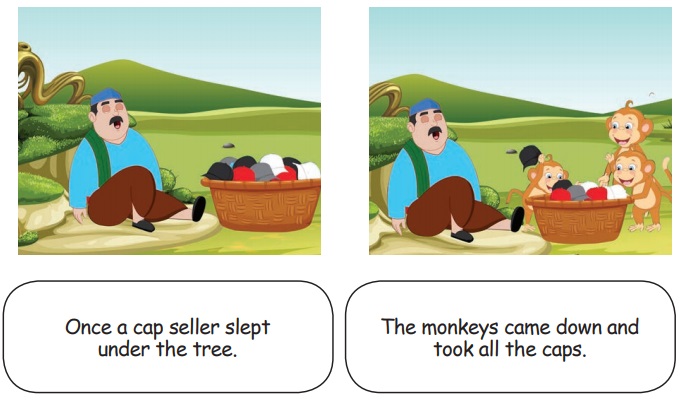
Once a cap seller slept under the tree.
The monkeys came down and took all the caps.
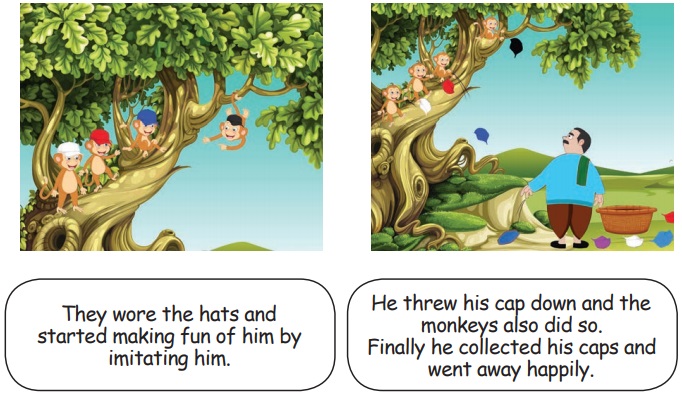
They wore the hats and started making fun of him by imitating him.
He threw his cap down and the monkeys also did so. Finally he collected his caps and went away happily.
Let us learn how to write a story using picture boards.
Step 1: Look at the picture and find the characters.
Step 2: Look at the picture and find what they are doing.
Step 3: Write it in a simple sentence.
Step 4: Repeat the steps as many times as you want.
Yes, it is that easy to write our own story. Do you want to try?
Complete the following picture board.
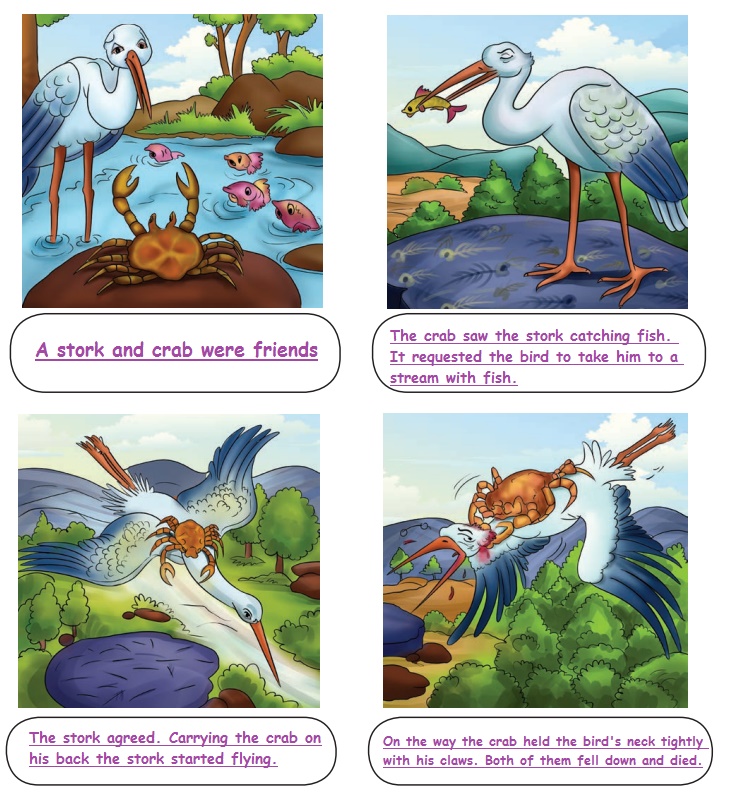
A stork and crab were friends
The crab saw the stork catching fish. It requested the bird to take him to a stream with fish.
The stork agreed. Carrying the crab on his back the stork started flying.
On the way the crab held the bird’s neck tightly with his claws. Both of them fell down and died.
I Can Do
A. Choose the correct option
1. The child got an __________ for winning the race.
a. award
b. magic
c. shock
Answer: a. award
2. I got __________ to see his favourite heroine.
a. fend
b. chance
c. deaf
Answer: b. chance
B. Match with the opposite gender.
1. prince – bridegroom
2. hero – princes
3. bride – heroine
Answer:
1. prince – princes
2. hero – heroine
3. bride – bridegroom
C. Write the correct word.
( rooster, king, hen, tiger, queen, tigress)
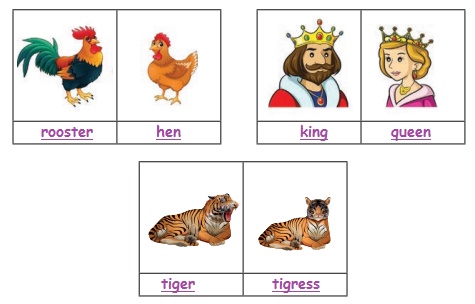
D. Recite the poem Never give up with correct intonation.
E. Match the rhyming words.
1. earn – day
2. fend – learn
3. glow – end
4. play – slow
Answer:
1. earn – learn
2. fend – end
3. glow – slow
4. play – day
F. Fill in the blanks with present continuous tense of the given word.
a. They are eating (eat) their breakfast.
b. He is reading (read) a news paper.
C. Bharathi is writing (write) his home work.
Learning Outcome
Now I can…
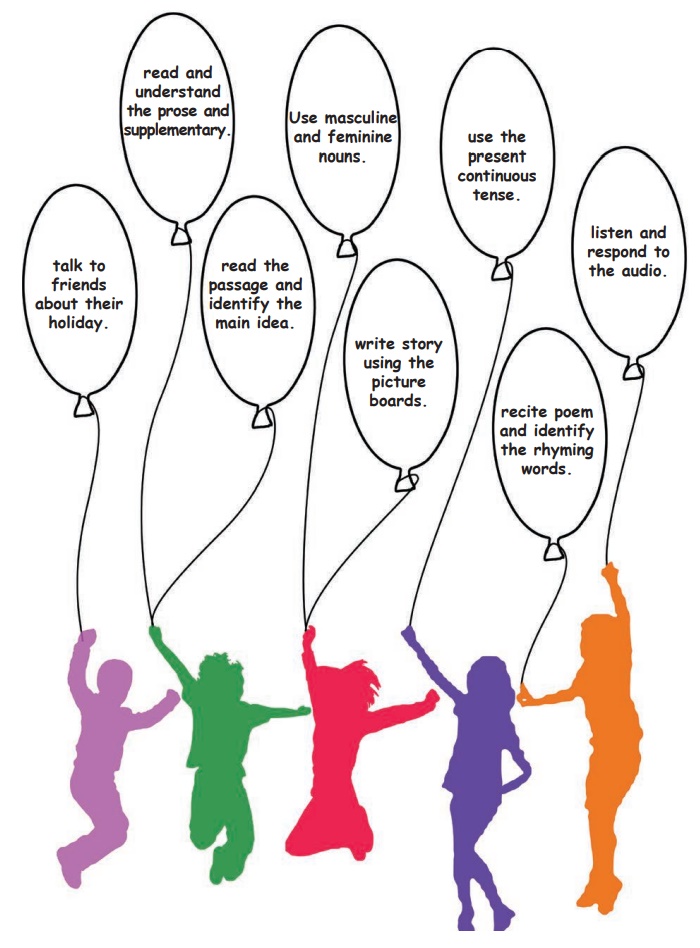
read and understand the prose and supplementary.
Use masculine and feminine nouns.
use the present continuous tense.
listen and respond to the audio.
talk to friends about their holiday.
read the passage and identify the main idea.
write story using the picture boards.
recite poem and identify the rhyming words.
Note to the teacher: Ask children to colour the balloon when they achieve the learning outcome.














